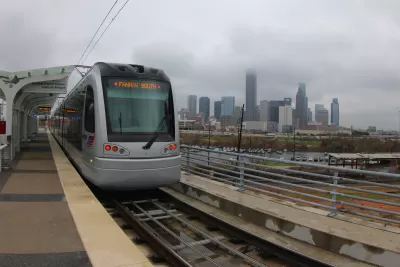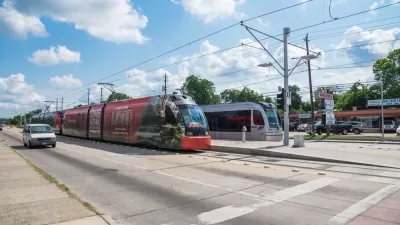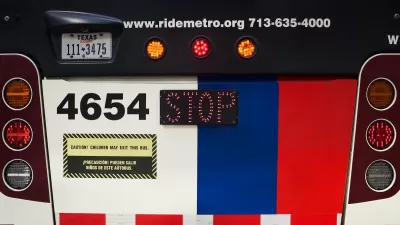While ridership dropped during the pandemic, many 'essential workers' continued to rely on Houston Metro's services, signaling the crucial role of public transit for the city's economy.

Dug Begley describes the findings of a report from Air Alliance, transportation advocacy group LINK Houston and the Robert D. Bullard Center for Environmental and Climate Justice at Texas Southern University that calls for greater funding of public transportation in the Houston region.
"Overall, Metro ridership dropped to about one-eighth normal levels early in the pandemic, leading the agency to drastically scale back bus and train service." But "many said the service offered was a crucial lifeline." According to researcher Nikki Hawkins-Knight, "[w]e cannot continue to build cities and hope to positively impact the health of our economy and communities without frequently assessing the impacts, deficiencies and user needs." Hawking-Knight goes on to say "[t]he transit ecosystem must integrate safety, sanitation, connectivity and overall reliability for it to be a true asset."
"The findings, authors said, point to more transit investment as a way to keep key employees showing up for work, offer a viable and safe option for travel and reduce pollution all at once." Ashley Johnson, director of community affairs at LINK Houston and a study co-author, says "Metro must continue to restore service and equitably implement its Moving Forward Plan as the COVID-19 pandemic demonstrates the vital role public transit plays in the economic vitality of our region."
FULL STORY: Despite fewer people riding Metro in Houston, report makes case for more public transit

Planetizen Federal Action Tracker
A weekly monitor of how Trump’s orders and actions are impacting planners and planning in America.

Restaurant Patios Were a Pandemic Win — Why Were They so Hard to Keep?
Social distancing requirements and changes in travel patterns prompted cities to pilot new uses for street and sidewalk space. Then it got complicated.

Map: Where Senate Republicans Want to Sell Your Public Lands
For public land advocates, the Senate Republicans’ proposal to sell millions of acres of public land in the West is “the biggest fight of their careers.”

Maui's Vacation Rental Debate Turns Ugly
Verbal attacks, misinformation campaigns and fistfights plague a high-stakes debate to convert thousands of vacation rentals into long-term housing.

San Francisco Suspends Traffic Calming Amidst Record Deaths
Citing “a challenging fiscal landscape,” the city will cease the program on the heels of 42 traffic deaths, including 24 pedestrians.

California Homeless Arrests, Citations Spike After Ruling
An investigation reveals that anti-homeless actions increased up to 500% after Grants Pass v. Johnson — even in cities claiming no policy change.
Urban Design for Planners 1: Software Tools
This six-course series explores essential urban design concepts using open source software and equips planners with the tools they need to participate fully in the urban design process.
Planning for Universal Design
Learn the tools for implementing Universal Design in planning regulations.
Heyer Gruel & Associates PA
JM Goldson LLC
Custer County Colorado
City of Camden Redevelopment Agency
City of Astoria
Transportation Research & Education Center (TREC) at Portland State University
Camden Redevelopment Agency
City of Claremont
Municipality of Princeton (NJ)





























